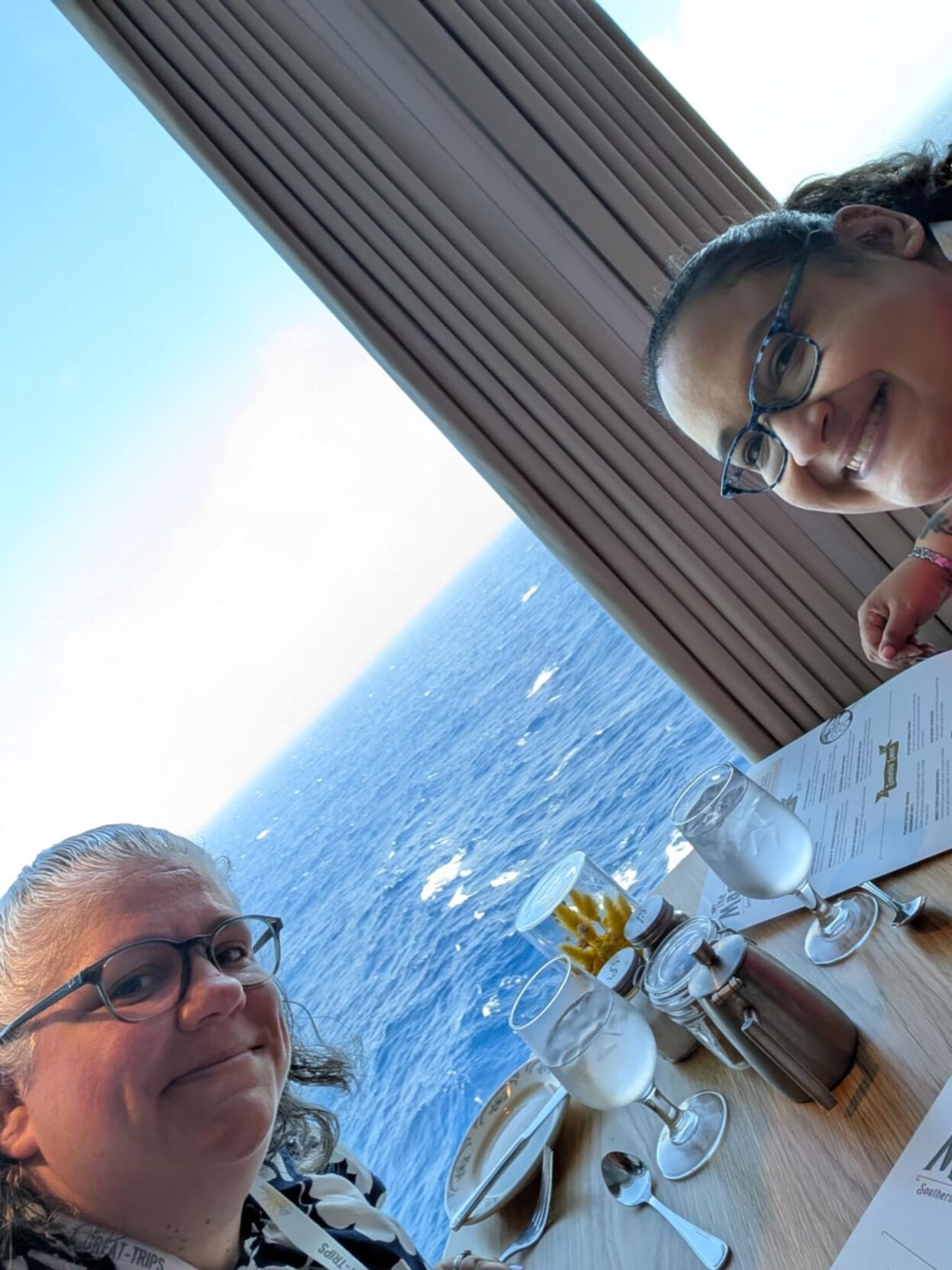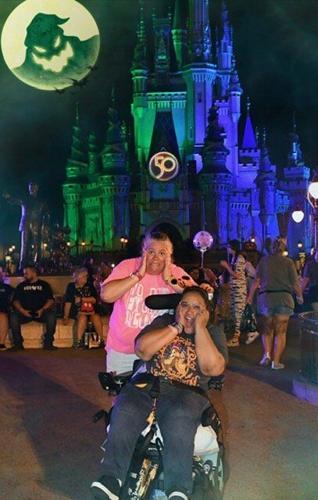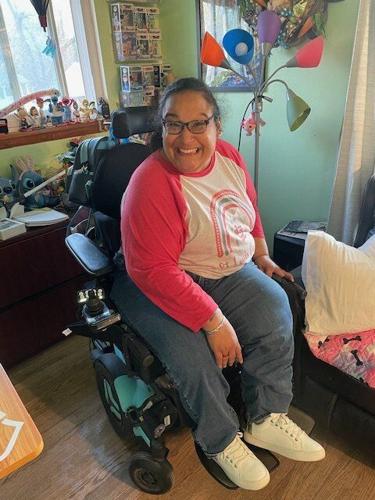ST. LOUIS COUNTY ŌĆö Christina Faria is a nervous traveler.
She loves being on vacation: taking in the scenery, meeting new people, shopping for souvenirs. But itŌĆÖs the uncertainty beforehand, sometimes months prior to her departure date, that weighs her down.
Faria, 43, has cerebral palsy, a neurologic disorder that impedes her movement. She has to make sure every leg of the trip can accommodate her wheelchair and other mobility aids, from the flight and the hotel to the beach excursions and stage performances.
ŌĆ£ItŌĆÖs not like you can show up and spitball this,ŌĆØ says Faria, who lives in Affton.
The logistical headaches of travel are multiplied for people with disabilities, a group that accounts for almost 30% of the American population, according to the Centers for Disease Control and Prevention. More than 1 in 10 people have conditions that limit their mobility. But accessibility ŌĆö of museums, theme parks, airports ŌĆö varies widely, with minimum requirements laid out by the Americans with Disabilities Act. Outside the United States, barriers are even more prevalent.
People are also reading…
Faria gets around in a $70,000 power wheelchair. She needs help getting dressed, showering and using the bathroom. Her balance is poor, and she struggles with some fine motor skills, such as cutting food.
She also lives for the theater. She loves group activities, like scavenger hunts and trivia contests. When she eats out, she always chats up fellow diners.

Christina Faria of south 51║┌┴Ž County prepares for a cupcake-making class while cruising on the Royal Caribbean's Utopia ship in November 2024.
ŌĆ£IŌĆÖm a real joiner,ŌĆØ Faria says. ŌĆ£Traveling to me is one big social activity.ŌĆØ
ItŌĆÖs also a heavy lift, one that ŌĆö since she fully lost the ability to walk during her teen years ŌĆö has kept her closer to home. Spur-of-the-moment trips are infeasible for many people with disabilities, so are ŌĆ£bargainŌĆØ options. Lodging choices are limited: Large hotels are only required to have about 3% of their rooms be mobility-accessible, and short-term rentals such as Airbnbs seldom have ramps or wide enough door frames. Ride-hailing services offer few wheelchair-ready vehicles.
Flying is fraught. The airplane bathroom, for many wheelchair-users, is unworkable. Layovers have to be long enough to make gate times. And the extra equipment leads to more security checks.
ŌĆ£We need way more suitcases than any normal person needs,ŌĆØ says Faria.
Every year, Faria and her caregiver schedule a few weekend outings to places like Chicago, Branson and Kansas City.
Her dream destinations, though, are much farther afield. SheŌĆÖs imagined what it would be like to see Italy since she was a little girl. And to honor her mom, a devout Catholic who died during the COVID-19 pandemic, she wants to go to Lourdes, France, where water from a grotto is believed to have healing powers.
Slow progress
In the 35 years since the American with Disabilities Act was passed, resources for travelers have steadily improved. Technological advancements have streamlined some tasks. Social media networks and specialty travel agents are available to offer tips, recommendations and warnings about where to steer clear.
During President Joe BidenŌĆÖs administration, $25 billion from the Bipartisan Infrastructure Law was earmarked to modernize airport terminals, including adding ramps and renovating restrooms.
In 2023, the U.S. Department of Transportation announced a requirement to make lavatories on new airplanes roomier. Airlines are developing systems that would allow wheelchair-users to stay in their wheelchairs during flights.
Still, progress has been slow. For some people, itŌĆÖs just easier to squelch any wanderlust.
ŌĆ£I donŌĆÖt travel often because it is a pain,ŌĆØ said Anna Corbitt of Alton. ŌĆ£I hate flying. I hate figuring out certain things.ŌĆØ
Corbitt, 35, works for Paraquad, a disability-services nonprofit based in 51║┌┴Ž. She has used a wheelchair her whole life and has a long inventory of horror stories: The time a travel agent tried to sell her a flight with a 20-minute layover in Atlanta, an airport that would take her at least two hours to traverse. The time her wheelchair was laid on the wrong side in the belly of the plane, causing thousands of dollars in damages. The time she was reassured that a building she was visiting was accessible, ŌĆ£except for that one step at the front.ŌĆØ
There have been bright spots. Washington, D.C., and Las Vegas are refreshingly uncomplicated to negotiate, Corbitt said. Organizations such as Wheel the World, founded by a man with paraplegia, make it easier to pinpoint the best accommodations. Corbitt keeps detailed notes of her online research.
ŌĆ£ThatŌĆÖs the Type A in me,ŌĆØ she said.
She longs to go on international treks. Australia is at the top of her wish list. But she doesnŌĆÖt see that happening. Too many things could go wrong.
ŌĆ£It scares the bejeezus out of me,ŌĆØ Corbitt said.
Melissa Walaitis, owner of Dream Bound Vacations in Manchester, built a second career around easing the concerns of reluctant travelers like Corbitt. The key to arranging a successful vacation, Walaitis said, is coordinating a personŌĆÖs day-to-day needs with what they want from a getaway: sightseeing, relaxing, adventure or something else.
ŌĆ£ItŌĆÖs really reading between the lines to make a match,ŌĆØ she said. ŌĆ£Every situation is different.ŌĆØ
Walaitis got her start in the business through her middle son, who has a developmental disorder. When her kids were little, she figured out travel workarounds for him. She was an elementary school teacher at the time but wrote guide books on the side to help friends and acquaintances who were in similar positions.
Soon, she had a small travel agency that catered to clients with autism, severe food allergies and physical disabilities. Ten years later, Walaitis employs a couple dozen agents; six are based in the 51║┌┴Ž area. TheyŌĆÖve planned more than 2,000 trips for people who require special accommodations.
Success on the sea
Faria, the Affton resident, had been planning a 40th birthday blowout at Walt Disney World with her mom when the pandemic hit. After her mom died, FariaŌĆÖs main caregiver, Wendi Bottoms, helped her reenvision the celebration.
The pair headed to Orlando, Florida, in 2022. There were plenty of highs ŌĆö the Magic Kingdom, nightly fireworks, the buzz of being around other Disney fanatics. The entertainment resort has a reputation for inclusivity.
But Faria couldnŌĆÖt do everything. She and Bottoms waited in line for an hour for the new ŌĆ£AvatarŌĆØ ride; then, Faria couldnŌĆÖt transfer onto the motorcycle-style seat.
ŌĆ£It really hurt for her to not do the things she wanted to do,ŌĆØ said Bottoms, who has been working with Faria for five years.

Wendi Bottoms (left) and Christina Faria dine aboard the Royal Caribbean's Utopia cruise ship in November 2024.
When they got home, Bottoms called Walaitis, whom she knew from a previous job. The travel agent suggested a cruise.
Faria was wary. What if something went wrong?
ŌĆ£ItŌĆÖs not like you can just get off the boat,ŌĆØ she said.
But Walaitis had been on the Royal CaribbeanŌĆÖs new Utopia and recorded every nook of the ship so Faria could preview it.
The shower was a walk-in. The toilet was tall enough. There was a motorized lift she could use to get into the pool. There were aqua shows, all-day buffets, two casinos and a couple dozen bars and lounges ŌĆö and she would be able to experience everything.
Faria and Bottoms sailed last year. They were looking at their calendars to book another cruise before they returned to dry land.
ŌĆ£It was awesome,ŌĆØ said Faria.
In December, they will get a Disney redo when they take a themed voyage to the U.S. and British Virgin Islands, on the Disney Treasure.
Typically, this would be the point when the worries and what-ifs creep in for Faria. But not this time. All she can think of are the adventures that await: the Haunted Mansion Parlor, the mariachi band at the Plaza De Coco, and, most especially, the Broadway-style ŌĆ£MoanaŌĆØ show.
Vacation is coming. And she is ready.
President Joe Biden celebrated the 31st anniversary of the Americans with Disabilities Act Monday, highlighting the progress made over the past three decades in advancing equity for people with disabilities, as well as the bipartisan spirit involved in getting the law passed.










